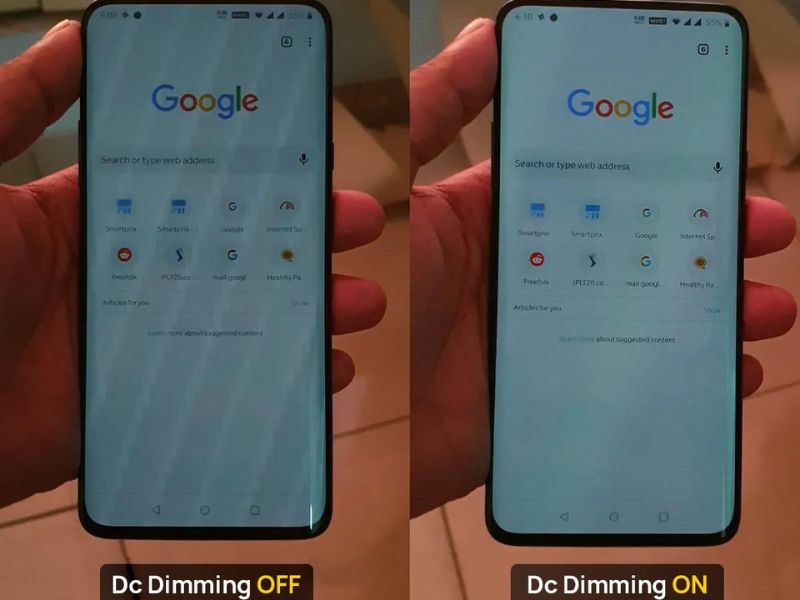In modern display technology, achieving optimal visual performance while minimizing power consumption and enhancing user comfort has become a crucial challenge. One of the methods employed to achieve this balance is DC dimming. This technique plays a pivotal role in improving display quality, particularly in liquid crystal displays (LCDs) and organic light-emitting diodes (OLEDs).
What is DC Dimming?
Before delving into DC dimming, it is essential to understand the general principles of display dimming. Dimming refers to the process of adjusting the brightness of a display screen. Traditionally, displays employ pulse-width modulation (PWM) to control brightness.

In simple words, DC dimming is a technology used in display devices to control brightness by adjusting the direct current (DC) supplied to the light source, as opposed to traditional methods like pulse-width modulation (PWM).
This approach has gained popularity due to its ability to enhance visual comfort and reduce power consumption. It is commonly used in smartphones, tablets, computer monitors, and televisions, especially OLED displays, where reducing eye strain and enhancing visual comfort are critical.
How DC Dimming Works
DC dimming operates by varying the direct current flowing to the display’s light source. This adjustment influences the intensity of light emitted, thereby controlling brightness levels.
- Voltage Adjustment: By decreasing the voltage supplied to the display, the amount of light produced by the backlight (in LCDs) or the OLED panel itself (in OLEDs) is reduced. This adjustment occurs continuously rather than in discrete steps, allowing for fine-tuned control of brightness.
- Analog Control: Unlike PWM, which operates on a binary state of on/off, DC dimming allows for an analog approach. This means the display can achieve a broad range of brightness levels seamlessly, without abrupt transitions that can lead to flicker.
DC Dimming Enabled Phones List
Here is the list of phones that support DC Dimming out of the box:
- Xiaomi Mi 11
- Xiaomi Mi 10
- Xiaomi MI 8
- Asus Zenphone 8
- Asus Zenphone 8 Flip
- Huawei P50 Pro
- Realme GT Neo 2
- Poco X4 GT
- Xiaomi Black Shark 4
- ZTE Nubia Red Magic 7S Pro
- Xiaomi 11T
- Poco F2 Pro
- Redmi K20
- Redmi K20 Pro
- Realme X
- Oppo Reno 10X Zoom
- And many others
Advantages of DC Dimming
Reduced Flicker: One of the most significant advantages of DC dimming is its ability to minimize flicker. Unlike PWM, which can lead to noticeable flicker at lower brightness levels, DC dimming provides a stable light output that is easier on the eyes. This is particularly beneficial for users who spend extended periods in front of screens, reducing eye strain and discomfort.
Enhanced Color Accuracy: DC dimming can also improve color accuracy. By providing a more stable light source, the colors produced on the screen can appear more consistent and vibrant across various brightness levels. This is especially important for applications requiring precise color reproduction, such as graphic design and video editing.
Energy Efficiency: In addition to improving visual comfort, DC dimming can contribute to energy efficiency. By reducing power consumption at lower brightness levels, it can extend the battery life of portable devices like smartphones and laptops. This makes it an attractive feature for manufacturers looking to enhance device longevity.
Better User Experience: For users, the transition between brightness levels feels more natural with DC dimming. The smooth adjustment contributes to an overall better experience, particularly in low-light conditions, where abrupt changes can be jarring.
Disadvantages of DC Dimming
Limited Brightness Control Range: While DC dimming offers smooth transitions, it can have limitations regarding the range of brightness levels achievable. In some cases, displays may not reach the same peak brightness levels achievable with PWM, potentially affecting visibility in bright environments.
Potential for Color Shift: In certain circumstances, DC dimming can lead to color shifts at lower brightness levels. This occurs because the light output from the display can become disproportionately skewed, affecting the overall color balance. Manufacturers must calibrate displays carefully to mitigate this issue.
Implementation Complexity: Integrating DC dimming into display technology requires advanced control circuitry and power management systems. This can increase manufacturing costs and complexity, which may not be feasible for all device types or price points.
Conclusion
In conclusion, DC dimming represents a significant advancement in display technology, addressing the challenges associated with traditional PWM methods. By providing a flicker-free, energy-efficient, and visually appealing experience, DC dimming enhances user comfort and satisfaction across various applications.
While it does have its limitations, the continued development and integration of this technology hold promise for the future of display systems. As we move forward, it will be interesting to observe how DC dimming evolves and shapes the next generation of display technologies, creating a more comfortable and efficient visual experience for users worldwide.